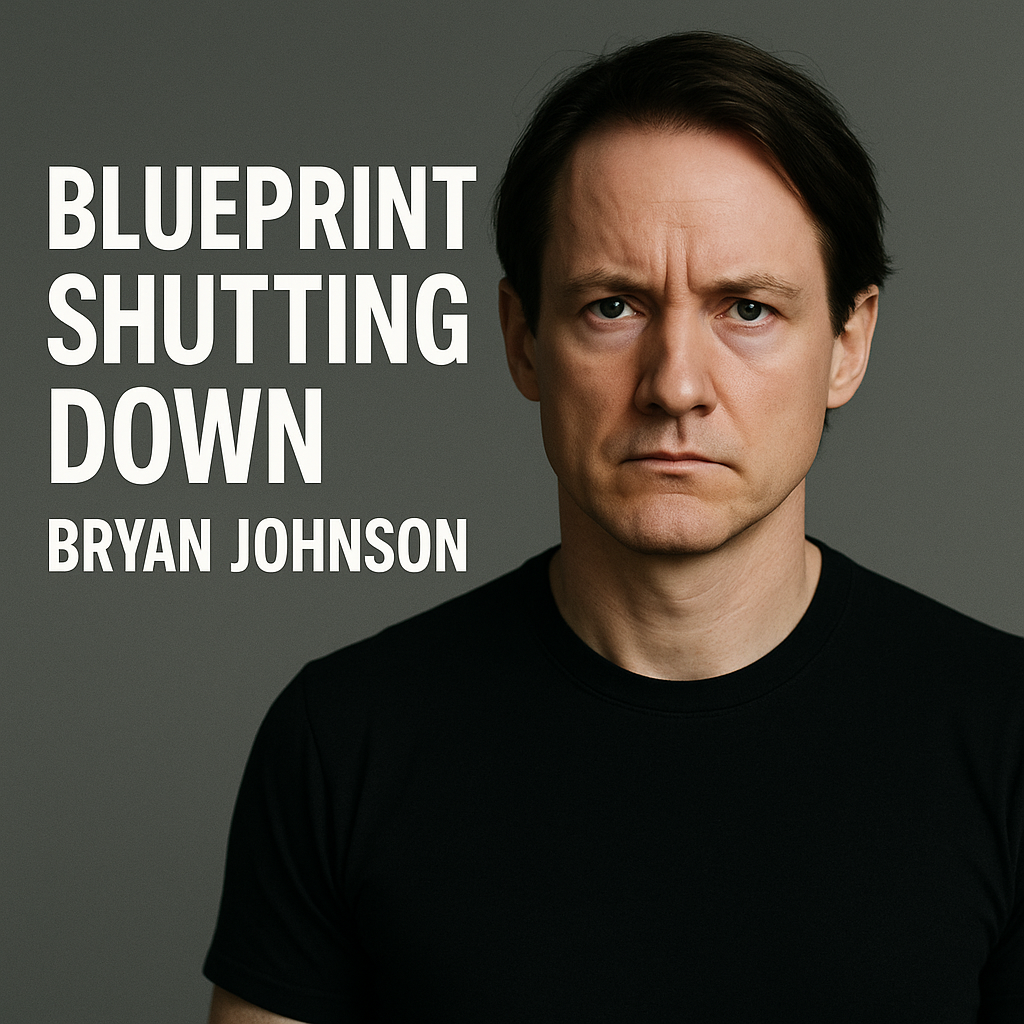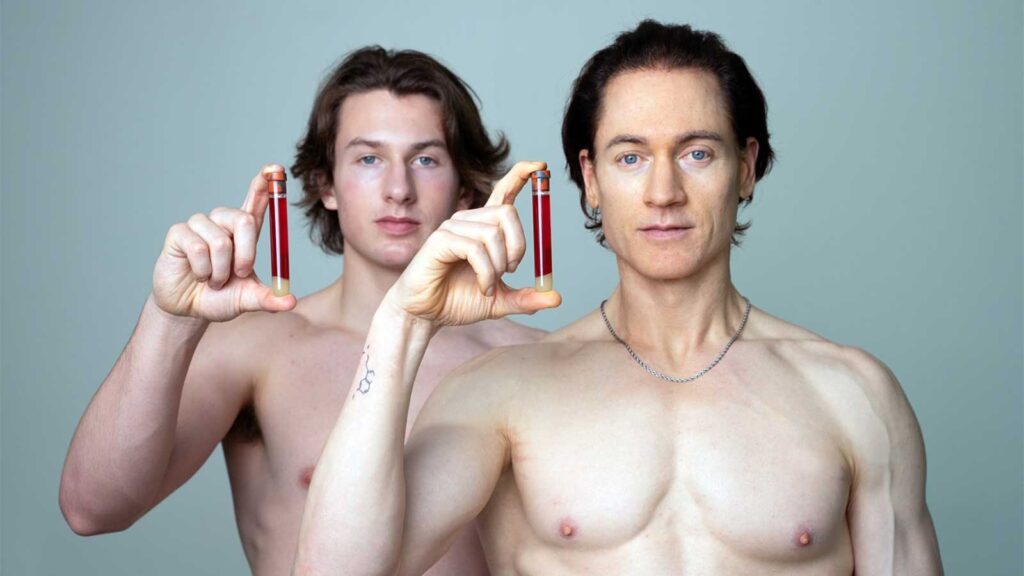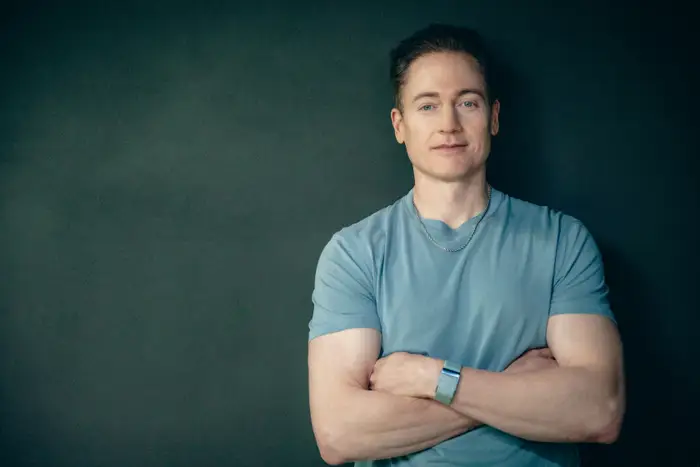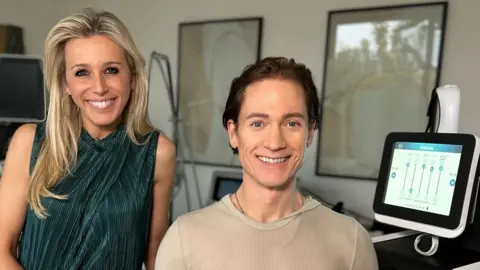
Bryan Johnson, the 47-year-old biotech entrepreneur known for his extraordinary $2 million annual quest to defeat aging and death, has made headlines in July 2025 with a significant announcement that marks a pivotal moment in his controversial career. The man who has become synonymous with extreme anti-aging protocols and the pursuit of immortality now faces a crossroads between commercial success and philosophical mission, ultimately choosing the latter in what could be his most important decision yet.
Blueprint Company on the Chopping Block
In a candid interview with Wired published on July 22, 2025, Johnson revealed his intention to either shut down or sell his longevity company Blueprint, describing it bluntly as a “pain-in-the-ass company”. This shocking announcement represents a dramatic shift for the entrepreneur who has spent years building both his personal anti-aging protocol and the commercial venture that emerged from it.
“Honestly, I am so close to either shutting it down or selling it,” Johnson told Wired’s Katie Drummond. “I don’t need the money, and it’s a pain-in-the-ass company.” The statement underscores Johnson’s evolving priorities as he increasingly focuses on what he considers more meaningful philosophical work rather than commercial ventures.
Blueprint, Johnson’s Los Angeles-based startup, has been selling a range of wellness products designed to help customers slow their aging process. The company’s offerings include a $55 “longevity mix” drink and a $42 mushroom-based coffee alternative called “Super Shrooms”. These products emerged from Johnson’s personal health regimen, which has garnered international attention for its extreme and comprehensive approach to biological optimization.
Johnson explained that he initially started the business because friends kept asking for his health supplements. “It evolved in a way where I was trying to do people a solid,” he said. However, he now believes that his commercial activities are undermining his credibility in the philosophical space. “People see the business and give me less credibility on the philosophy side,” Johnson explained. “I will not make that trade-off. It is not worth it to me. So yeah, I don’t want it”.
Financial Challenges and Media Scrutiny
The decision to potentially close Blueprint comes amid reports of financial difficulties for the company. Earlier in 2025, The New York Times reported that Blueprint was missing its break-even point by at least $1 million monthly, citing internal records, court filings, and employee interviews. The report suggested that Johnson, who had invested $25 million as Blueprint’s sole investor, had warned executives that the company was running out of money.
However, Johnson has disputed these financial claims, telling Wired that Blueprint is not in “some kind of emergency financial situation”. “We are break-even, and I’ve said that publicly many times. We’ve had profitable months, we’ve had loss months,” he asserted. Despite these denials, the potential sale or closure of the company suggests that financial pressures may indeed be playing a role in his decision-making process.
Johnson was emphatic that his decision was not driven by The New York Times report. “It has nothing to do with The New York Times. I am not hiding from the New York Times article. I’m happy to take, head-on, every single allegation they made,” he said. Instead, he framed his decision as a strategic choice to focus on what he considers more important work.
The “Don’t Die” Religion: A New Chapter

Johnson’s shift away from Blueprint is closely tied to his growing focus on his newly founded religion called “Don’t Die,” which he announced in March 2025. This movement represents Johnson’s attempt to create what he calls “the grand unifying theory of existence,” designed to address fundamental challenges facing humanity in the age of artificial intelligence.
The “Don’t Die” religion is structured around the core belief that the body is sacred and that existence itself is the primary virtue and objective. Johnson has described it as a comprehensive framework for living that transcends traditional religious, political, and economic systems. The movement includes small group meetings patterned after support groups like Alcoholics Anonymous, where participants engage in opening rituals, mantras, and sessions where they apologize to their bodies for inflicting harm upon themselves.
In his vision for the future, Johnson believes that “Don’t Die” will become “history’s fastest-growing ideology” and will play a crucial role in helping humanity transition into the AI era. He argues that the world is experiencing four fundamental shifts that necessitate this new framework: the emergence of AI-driven superintelligence, the lack of existing ideologies that address AI alignment, the uncertainty of humanity’s survival in the AI era, and the possibility of overcoming biological death.
Johnson’s approach to this religion reflects his engineering background and data-driven methodology. “On a personal level, for years I’ve tried to eat, sleep and breathe ‘Don’t Die,’ literally,” he wrote on social media. “To embody it in every one of my 35 trillion cells. Practically this means: going to bed on time, exercising daily, and eating nutritiously, measuring and improving every organ in my body, eliminating toxins, lowering stress, being with family and friends”.
Project Blueprint: The Foundation of His Philosophy
Johnson’s commercial and philosophical work both stem from his personal Project Blueprint, an extraordinarily comprehensive anti-aging program that he launched in 2021. This project involves Johnson spending $2 million annually on medical diagnostics, treatments, and lifestyle optimization in an attempt to slow and potentially reverse the aging process.
The scope of Project Blueprint is unprecedented in its thoroughness and scientific rigor. Johnson undergoes dozens of diagnostic tests regularly, creating a comprehensive database of his biological functions that informs every decision about his diet, exercise, sleep, supplements, and medical interventions. His daily routine is algorithmically designed and strictly regimented: he wakes at 4:30 AM, consumes all his meals before 11:00 AM, takes over 100 pills containing various supplements, exercises intensively, and goes to bed at 8:30 PM.
Johnson’s supplement regimen alone demonstrates the extreme nature of his approach to health optimization. His daily protocol includes collagen protein, creatine, prebiotic galactooligosaccharides, various vitamins and minerals, and specialized compounds like nicotinamide riboside and N‑acetyl-L-cysteine. Each supplement is carefully selected based on his ongoing health data, and the regimen is continuously adjusted to optimize his biological markers.
The entrepreneur has described himself as “the most measured person in history,” referring to the extensive data collection that informs every aspect of his health protocol. His team of over 30 doctors and health experts tracks everything from his organ function to his biological age markers, creating what he claims is the most comprehensive health optimization program ever undertaken by an individual.
Controversial Experiments and Public Attention
Johnson’s quest for longevity has included several controversial and highly publicized experiments that have garnered both fascination and criticism from the public and medical community. One of the most notable was his blood transfusion experiments, which involved receiving plasma from younger donors, including his teenage son Talmage.

In April 2023, Johnson undertook what he called “the world’s first multigenerational plasma exchange,” where he, his 17-year-old son, and his 70-year-old father participated in a blood plasma swap. Talmage donated a liter of blood that was separated into plasma and other components, with the plasma being transfused into Johnson. Johnson then donated his plasma to his father.
However, after six months of young plasma exchanges, Johnson announced in July 2023 that he was discontinuing the treatment. “Evaluated biomarkers from biofluids, devices and imaging, no benefits detected,” Johnson reported. “Young plasma exchange may be beneficial for biologically older populations or certain conditions. Does not in my case stack benefit on top of my existing interventions”.
More recently, in 2025, Johnson underwent another controversial procedure he called “V2” – a complete plasma replacement where all his plasma was removed and replaced with albumin, the main protein component of plasma. “I removed all the plasma from my body,” Johnson announced on Instagram, “and the doctor said it’s the cleanest she’s ever seen”.
International Incidents and Public Relations Challenges
Johnson’s extreme health consciousness has also led to some unusual public incidents that have brought additional attention to his methods and philosophy. During a visit to India in early 2025, Johnson made headlines when he walked out of a podcast recording with Zerodha co-founder Nikhil Kamath, citing concerns about air quality.
According to Johnson, the air quality index in the recording space reached 130, with PM2.5 levels at 75 µg/m³ – “equivalent to smoking 3.4 cigarettes for 24 hours of exposure”. The poor air quality, he said, caused skin irritation, burning eyes, and a sore throat. “This was my third day in India, and the air pollution had made my skin break out in a rash and my eyes and throat burn,” he stated.
Johnson’s reaction to India’s air pollution sparked considerable discussion on social media, with some viewing his response as extreme while others saw it as highlighting a legitimate health concern. He expressed surprise at how normalized air pollution had become in India, noting that “people would be outside running. Babies and small children exposed from birth. No one wore a mask, which can significantly decrease exposure”.
The incident illustrated the extent to which Johnson’s health optimization protocols have shaped his daily life and decision-making processes. His willingness to leave a high-profile podcast recording demonstrates his commitment to maintaining the strict environmental and health standards that are central to his Project Blueprint program.
Financial Resources and Investment Philosophy

Johnson’s ability to pursue such expensive longevity experiments stems from his successful exit from the payments company Braintree, which he founded in 2007. PayPal acquired Braintree for $800 million in 2013, providing Johnson with the financial resources that have enabled his ambitious health and science projects.
Current estimates place Johnson’s net worth at approximately $400 million as of 2025. This wealth has been strategically deployed across multiple ventures: $100 million for OS Fund, his venture capital firm investing in early-stage science and technology companies; $54 million for Kernel, his neurotechnology company developing brain-computer interfaces; and $2 million annually for his personal Project Blueprint experiments.
Johnson’s investment philosophy through OS Fund demonstrates his commitment to addressing fundamental challenges facing humanity through scientific breakthroughs. The fund focuses on genomics, synthetic biology, advanced materials, and artificial intelligence, reflecting his belief that solutions to major human problems will come from foundational scientific discoveries rather than incremental improvements.
The scale of Johnson’s personal spending on health optimization is remarkable when viewed in context. While the average American spends approximately $12,000 annually on healthcare, Johnson’s $2 million yearly investment represents more than 160 times the national average. This disparity highlights both the experimental nature of his approach and the resources required to pursue such comprehensive health optimization.
Recent Health Protocol Updates and Developments
Johnson’s health protocol continues to evolve based on ongoing research and personal experimentation. Recent updates to his Blueprint protocol in 2025 include several significant changes that reflect his commitment to evidence-based optimization.
In January 2025, Johnson paused his use of Cerebrolysin, a neurological treatment he had been taking since September 2024. He also began hyperbaric oxygen therapy (HBOT) in November 2024, targeting 60 sessions at 2 ATA with 20 minutes of 100% oxygen and 5‑minute breaks. Additionally, he adjusted his Metformin dosage from 1,500 mg to 1,000 mg daily in May 2024.
One notable addition to his protocol was oral minoxidil, which he began taking in January 2024 at 2.5 mg daily, later increasing to 3.75 mg daily by February 2024. This medication, typically used for hair growth, represents Johnson’s willingness to explore pharmaceutical interventions for aesthetic and health optimization.
Johnson’s supplement regimen has also been streamlined somewhat in 2025, with the development of proprietary multivitamin formulations that have reduced the need for individual pills. His current protocol includes Blueprint Essentials Capsules containing 24 compounds for stress, muscle recovery, and cognition, and Blueprint Soft Gel containing seven compounds for vision and eye health.
The Future of Longevity Research and Human Enhancement

Johnson’s work, while controversial, has contributed to broader conversations about the future of human longevity and the role of technology in life extension. His “Don’t Die” movement represents an attempt to create a philosophical framework for navigating the intersection of human enhancement, artificial intelligence, and existential risk.
The entrepreneur’s belief that death can become optional reflects a growing movement within Silicon Valley and the broader tech community that views aging as a problem to be solved rather than a natural process to be accepted. His willingness to invest millions of dollars in personal experimentation has generated valuable data about the practical challenges and potential benefits of comprehensive health optimization.
Johnson’s transition away from commercial activities toward philosophical work suggests a recognition that the most important questions raised by his experiments may not be scientific or medical, but rather ethical and existential. His “Don’t Die” religion attempts to address these deeper questions about human purpose, meaning, and responsibility in an age of rapidly advancing technology.
Implications for the Longevity Industry
Johnson’s decision to potentially shut down Blueprint has implications for the broader longevity industry, which has grown rapidly in recent years. His company represented one of the most high-profile attempts to commercialize cutting-edge anti-aging research and translate personal experimentation into consumer products.
The financial challenges faced by Blueprint, despite Johnson’s significant personal investment and public profile, highlight the difficulties inherent in building sustainable businesses around longevity products. The market for such products remains relatively niche, and regulatory challenges continue to limit the claims that companies can make about anti-aging benefits.
Johnson’s shift toward a philosophical approach may signal a recognition that the most valuable contributions to human longevity may come not from commercial products but from advancing scientific understanding and changing cultural attitudes toward aging and death. His “Don’t Die” movement represents an attempt to create a broader social transformation that could support more extensive investment in longevity research.
Looking Forward: The Legacy Question
As Johnson contemplates the future direction of his work, he faces fundamental questions about legacy and impact that extend far beyond his personal quest for longevity. His current transition represents a choice between building a profitable business and advancing what he sees as a more important mission to transform human civilization’s approach to mortality.
The success or failure of Johnson’s “Don’t Die” movement will ultimately be measured not in financial returns but in its ability to influence how humanity thinks about aging, death, and the optimization of human potential. His willingness to sacrifice commercial opportunities for philosophical pursuits suggests a man grappling with questions of purpose that extend well beyond personal health optimization.
Johnson’s journey from successful entrepreneur to longevity extremist to philosophical leader represents a unique case study in how extraordinary wealth can provide the freedom to pursue increasingly unconventional goals. Whether his vision of making death optional can gain traction beyond Silicon Valley speculation and into mainstream acceptance remains to be seen.
The coming months and years will reveal whether Johnson’s latest pivot represents a temporary setback or a strategic repositioning that allows him to have a more profound impact on humanity’s relationship with mortality. His willingness to abandon a profitable business for the sake of philosophical credibility demonstrates a level of commitment to his mission that suggests this transition is likely permanent.
As Bryan Johnson continues to evolve from entrepreneur to philosopher to potential religious leader, his story serves as a fascinating window into the intersection of technology, wealth, and human ambition in the 21st century. His latest news may mark not the end of his public influence, but rather the beginning of his most important chapter yet.

Leave a Reply